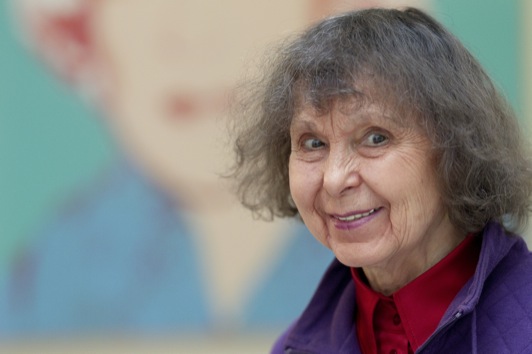World premieres by Schuller and Gubaidulina headline wide-ranging Contempo program

On Sunday afternoon the new-music collective Contempo performed the second installment of its 50th anniversary season at the Reva and David Logan Center for the Arts at the University of Chicago. Two Contempo-commissioned world premieres by Sofia Gubaidulina and Gunther Schuller were the main events on the program. Yet the musicians—drawn from ensembles-in-residence eighth blackbird and the Pacifica Quartet (and filled out with guest artists)—offered thoughtful, incisive readings of several works from a wide stylistic spectrum.
Helen Grime’s two-movement Entwined Channels for two pianos opened the program, performed by eighth blackbird’s Lisa Kaplan and pianist Daniel Schlosberg. Throughout this work both performers’ playing is almost never synchronized, instead mirroring and imitating each other’s musical affects. The first movement lay entirely in the upper range of both instruments, which created a shimmering, otherworldly texture reminiscent of Debussy but with the harmonic dialect of Webern. This prolonged stay in the instruments’ upper registers made the low pedal tones that began the second movement especially jarring, and Schlosberg’s right-hand tremolos were also particularly impressive here.
After a stage change that would have made any AV club proud—a large pair of speakers were assembled onstage and connected to a waiting laptop—flutist Mary Stolper joined electronic-music guru Benjamin Sutherland for Howard Sandroff’s Chants des Femmes for flute and electronics.
Inspired by a conversation among a group of women in a French dialect the composer overheard but could not understand, the work featured electronically manipulated sounds of sampled flutes as a partner to the soloist’s live performance. In the first movement these samplings created a jungle atmosphere that lent Stolper’s piccolo playing the quality of a wistful yet anxious exotic bird. The second movement had extensive sampling of flutter-tounged alto flutes, which sounded preternaturally like human voices, and the electronic effects of the final movement (for C flute) achieved a sound like cats’ purring carried on the wind. Throughout Stolper’s elegant, delicately spun lines were imitative of the recorded ones, and though both parties “played” similar material, the distinct sonic contrast between a live performer and recorded samples was consistently striking.
Gunter Schuller’s Four Chromatic Adventures was heard in its world premiere. Conducted by Cliff Colnot, the work is written for nine players, which here included the Pacifica Quartet, eighth blackbird’s flutist Tim Munro, clarinetist Michael J. Maccaferri, percussionists Matthew Duvall and Doug Perkins, and guest harpist Alison Attar.
The work is cast in four descriptively titled movements (“Triplicity,” “Cortège,” “Arabesque,” and “Eccentric”). The “Cortège” achieved an idiomatically funereal atmosphere, with murky pulses from the harp’s low register, bass drum and tam-tam. The other movements, however, did not live up their evocative titles, falling into the trap of sounding essentially undifferentiated, which chromatic music so easily can. The most eccentric-sounding thing about the last movement was the brief use of a flexatone, which surely sounded stranger when Khatchaturian used it in his 1936 Piano Concerto, but has since lost its power to shock. Still, the musicians provided a vital and intense performance. Schuller received an appreciative ovation, which the 89-year-old composer acknowledged from his seat with a pleased smile and wave of his cane.
Earl Kim’s song cycle Now and Then opened the second half. The five lapidary songs on texts of Beckett, Chekhov, and Yeats, were intelligently and sensitively sung by soprano Michelle Areyzaga, accompanied by a trio of flute (Munro), harp (Attar), and viola (Masumi Per Rostad). The dystopian opening “On the meadow,” after Chekhov’s The Seagull, about a world devoid of living creatures, was aptly desiccated and mournful; the brief “thither,” accompanied only by the harp, captured the pointillist essence of Beckett’s language; and Areyzaga’s robust singing in “Roundelay” was colored with gentle commentary from the flute and viola.
The other world premiere Sunday was Der Pilger by celebrated Russian composer Sofia Gubaidulina. As the title suggests, the music is said to evoke pilgrims’ journeys, scored for a quintet of violin, double bass, harp, and two percussionists,
Der Pilger opens with a boisterous timpani solo with sliding pitches, and then settles into a series of disconnected episodes. The soaring violin lines from eighth blackbird’s Yvonne Lam were impressively sculpted, and percussionists Matthew Duval and Doug Perkins were all over a battery of instruments that might envy a Varèse orchestra (including a lattice of thirteen suspended gongs). Kaplan played a shapely piano solo that probed the highest and lowest registers of the instrument, which segued into prolonged, vigorous marimba glissandi that generated a crazed wash of sound. An almost-earsplitting gesture from the tam-tam brought the work to a close.
While the playing throughout was dedicated and impassioned, over the long haul Gubaidulina’s work was a struggle to listen to, full of tormented dissonances and lurching ascents, leaving one with the impression of too much sound for sound’s sake. The audience clearly enjoyed the work with Gubaidulina, 83, receiving a warm and enthusiastic ovation when she took the stage.
Contempo’s 50th season continues 7:30 p.m. April 23 at the Logan Center with works of Francisco Castillo Trigueros, Michael LaCroix, David Gordon, Eric Brinkmann, and Yuan-Chen Li. https://lucian.uchicago.edu/blogs/contempo/schedule/
Posted in Performances


